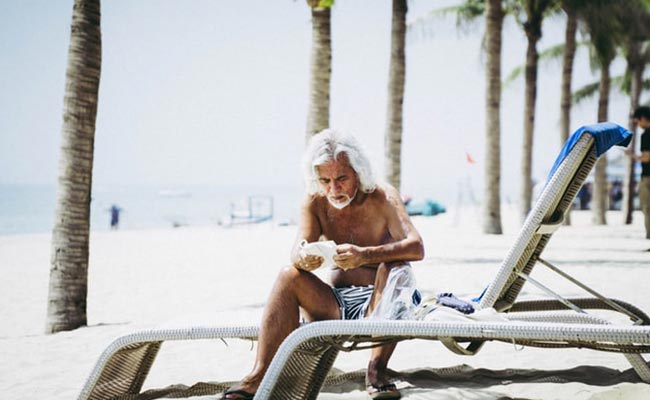Being a young, single man living in Thailand, I never thought twice about making a Will. It always seemed like something for “old people”, or those with real responsibilities.
But getting married and having a child meant that I needed to consider someone else's future, and how their lives would be impacted if I passed away.
Moreover, it's naive to think it “won't happen to you”. It isn't just people over 60, 70 or 80 who die. Every year, young people's lives are tragically taken in accidents and through illness, be that in Thailand or elsewhere.
If you're looking to make a Will in Thailand and do the sensible thing by making sure your affairs are in order, this post will walk you through the law, the process and all the points you need to consider.

Life by the beach doesn't last forever…sadly.
Contents
Why You Need a Will in Thailand
If you don't have a Will in Thailand, it will make it very difficult for your loved ones to make a claim on your assets when you pass away.
The process can be long and drawn out, so much so that many extended family members don't bother or give up, particularly if they are living outside of Thailand.
Having a Will makes the process easier on your loved ones.
Generally speaking, you only need a Will in Thailand if you fall into one of the following four categories:
- You spend the majority of the year in Thailand
- You are retired in Thailand
- You are married to a Thai national / you have children in Thailand
- You own property or assets in Thailand
What Happens When You Die Without a Will
The law in Thailand is very clear about what happens if a person dies without a Will.
Section 1635 of the Thai Civil and Commercial Code stipulates that your spouse will be entitled to half your marital assets, with the remaining property divided between the spouse and children or statutory heirs (under Section 1629).
If you don't have children, the remaining property will go to any surviving parents.
If your parents are not alive, or you do not have parents, then the remaining property will be divided among your siblings.
If you have no siblings, then next in line would be step brothers and sisters. They are followed by grandparents, and then aunts and uncles.
If it transpires that the heir is a minor, a person of unsound mind, or a person incapable of managing his or her affairs (as set out in the Thai Commercial and Civil Code), then the court will appoint a curator of the Will.
If you have no Will and no surviving relatives, your estate will go to the state.
What Your Heirs Have to Do When You Die
Whether or not you have a Will, your heirs, most likely your relatives, will need to hire a lawyer and go to the probate court. If they are living overseas, they will need to travel to Thailand to complete the process.
This is why it is very important that you have a Will, otherwise your relatives may be required to travel back and forth to Thailand to sort out your affairs.
Writing Your Own Will in Thailand
You can write your own Will, but bear in mind that it must be compliant with Thai regulations.
You will also want to have the Will translated into Thai; so that the courts understand it.
A Will is valid in your native language, but it's important to have the translation for ease of process.
The Will must be witnessed by two people and can be registered (filed) at your local district office.
Doing so means it is on file and easily accessible in the event of your death. The filed version should be in Thai.
The benefit of hiring a law firm to write a Will for you is to ensure that no stone is left unturned.
Those who specialize in Wills know the mistakes people make and how to avoid them. They also know what a good Will looks like and what is fully acceptable to the courts.
If, for example, you were to accidentally leave out a part of your estate, or not properly stipulate the conditions of a certain section of the Will, it would cause problems for your relatives and have to be referred to the probate court.
What Documents You'll Need
To prepare your Will, you will need a list of beneficiaries and the following information for them:
- Name
- Phone number
- Address (country of residence included)
In addition, you will need the identification of the executor(s) of your Will. An executor is someone who is named in the Will as responsible for dealing with the estate.
You will also need to make a list of your assets, unless you are giving your entire estate to one person. However, it still makes sense to make a list, just so that you can visualize exactly what you have and who it's going to be left to.
If your assets are to be divided among multiple beneficiaries, then you will need a list to be included in the Will.
You will also need your bank details, so the Will can state where your money (cash) is held.
Witnesses
Anyone other than a beneficiary can witness a Will.
Of course, the person must be an adult (not a minor), and you must be present when they sign.
A witness cannot be blind, deaf, or mute, or legally considered to be of unsound mind.
Note that a beneficiary can be listed as an executor but cannot witness the Will.
Other than the beneficiaries, anyone can be a witness to the Will, as long as they are adults and present when you sign.
The beneficiary in the Will can be appointed as the executor or the administrator, but cannot be a witness of the Will.
Choosing an Executor
Of course, the key factor in choosing an executor is to choose someone you trust. That being said, it is a good idea to choose an executor who lives in Thailand, and preferably one who speaks Thai or is close friends with someone who speaks Thai.
You'd also do well to make sure the person is younger than you, or at least of similar age, otherwise they might die before you and you will have to amend the Will.
You can have more than one executor; so feel free to choose two trustworthy people.
If you do not appoint an executor, an administrator will be appointed by the Thai Probate Court to manage and administer your estate.
What to Include in Your Will
In order for your beneficiaries to receive your assets, you’ll have to list those assets in your will.
Assets can be considered real estate, investments, money in the bank, and even vehicles.
1. Local Assets
Local assets are the assets you have in Thailand, not those in any other country. This might include your condo, car or motorbike, and gold jewelry, for example.
2. Real Estate
Real estate refers to a condo, house, or land.
Note that if your condo or house has a lease, this terminates upon your death.
If you have freehold, the property can be passed to your heirs. However, if you do own your condo under Section 19 of the Condominium Act, the heir must sell the condo within one year.
You can also pass land on to an heir, but again it must be sold within a year.
If a piece of land is unsold after a year, the Director-General of the Land Department will sell the land and charge a fee of 5% of the sale price (before deductions or taxes).
Shares in a Thai Company
Shares in a Thai company are not passed to heirs upon your death. The assets of a foreign director belong to the company and not the individual.
In the event of your death, a shareholder meeting must be called and a new director appointed. The shares are then transferred to the new director at the Ministry of Commerce.
Bank Accounts
If you have a joint bank account with your spouse, the account will be transferred to your spouse upon your death.
If the account is not joint, the bank will freeze the account when you pass away.
If you want your spouse to have immediate access to your money upon your passing, you should consider making the account joint while you are alive.
Overseas Assets
You will need a separate Will for overseas assets because the Thai court is concerned only with the assets you have in Thailand.
You should file a Will for your overseas assets in your home country, or in the country they are in, depending on the legal status of those assets in the given territory.
Funeral Requests
Funeral arrangements are a common feature of a Will. This is where you specify the type of funeral you would like. If you don't want a funeral, you can do that too.
The executor or administrator will have to arrange your funeral, unless you specify a person in your Will.
If there is no executor, then the person who receives the greatest portion of your estate, either by Will or statutory inheritance, becomes responsible for arranging your funeral.
Inheritance Tax
This is a very important area and no doubt one you'll be concerned about.
In Thailand, inheritance tax is only paid on an estate valued at over 100 million Baht.
Ascendants pay 5% tax, and descendants and others pay 10%.
The tax is applied to both Thai nationals and foreign nationals.
Interestingly, surviving spouses are not liable for inheritance tax.
Note that heirs under 20 years of age are subject to inheritance tax, but their parents must file a tax return on their behalf.
I have a comprehensive post with further information on Inheritance Tax here.
Writing a Living Will (Advance Decision to Refuse Treatment)
A Living Will, or Advance Decision to Refuse Treatment, to use its legal name, enables you to stipulate medical treatments that you don't want in the event that you are unable to make or communicate decisions for yourself.
A Living Will should be specific on what actions you don't want medical staff to take if you are terminally ill, such as pain management, ventilation, tube feeding, etc.
The Living Will comes into effect if you are unable to communicate your wishes verbally or physical and you are medically deemed to be in a terminal state (facing end of life).
You can have one professionally drawn up or create one from an online template.
You'll need the Living Will in English and Thai to ensure medical professionals fully understand your wishes.
If you're from the US, you can view a Living Will template here.
If you're from the UK, go here.
For other countries, a simple Google search will find you a template.
1. Power of Attorney
Once drafted, you will give someone the power to execute your wishes. This could be a family member or even a health care representative.
The Living Will requires your signature, the signature of the person you assign as your representative, and two witnesses. It does not require notarization
If you are receiving ongoing treatment at a hospital, you can ask the hospital if it is possible to file the Will there, though most hospitals don't do this as standard practice.
Note that a hospital will give you the life-saving treatment you require until they are made aware of a Living Will that instructs them to do otherwise.
You should give a copy to your health care representative and any close family members, so that they are aware of your wishes.
2. Choosing a Health Care Representative
It's worth noting that due to Buddhist beliefs, many Thai people may take issue with agreeing to oversee your refusal for end of life treatment. This may include your spouse or family members.
It is therefore imperative that you clearly communicate your wishes and explain your intentions for end of life care.
You will need to find someone who is comfortable with seeing those wishes through and isn't going to be burdened by guilt going forward – due to their spiritual beliefs.
3. Thai Law & End of Life Care
Under the National Health Care Act 2007, a Living Will is accepted and a patient has the right to refuse treatment if they are facing terminal illness and an incapacity to communicate.
However, you must be of sound mind when writing the document and considered “legally fit”.
Note that euthanasia is illegal in Thailand.
Summary
The reality is that every adult with notable assets should have a Will. A Living Will is optional, depending on your opinions on end of life care.
Having initially set out to make a Will myself, I quickly realized there was a huge amount to consider and felt pretty overwhelmed when I started to write one – there's so much to consider.
It's really not that costly to have a law firm do it for you, and it certainly takes the guess work out of the process.
Either way, don't put it off. Get it done and make things easy on your loved ones when it's your turn to pass.
——
Got a specific question I haven't covered here? Leave it down below.
If you haven't yet made a Will, I'm guessing you probably haven't got life insurance cover either?
If not…
+ Click here to read about Life Insurance
More Tips for Life Planning
Need help with pension or investment planning?
+ Connect with my trusted personal IFA using this form
Got Medical Insurance?
+ You should have. Get a quote on international cover here.
Need to send money to Thailand?
+ Go here to find out the cheapest way. Everyone is using this
Last Updated on



Graham says
Feb 03, 2025 at 6:58 pm
Tom says
Do you know if the following assets with my girlfriend, not spouse will transfer to her if both our names are on the title or account?
joint bank accounts, condo, vehicles
Feb 18, 2024 at 1:10 pm
Jeff Beswick says
Aug 09, 2023 at 8:51 am
JamesE says
Aug 10, 2023 at 10:28 pm
Lana Scott says
Lana
Mar 04, 2023 at 10:40 am
TheThailandLife says
Mar 05, 2023 at 5:15 am
RAYMOND GOODWIN says
Dec 03, 2022 at 10:03 am
JamesE says
Dec 04, 2022 at 12:35 am
David Dickinson says
May 27, 2021 at 1:18 pm
TheThailandLife says
May 27, 2021 at 4:32 pm
Bob says
May 27, 2021 at 5:09 pm
Hilton says
Would also like to know about long term staying permit hear some thing is on the table if you have property in Thailand now, i asked around but visa agents don't seem to know anything about it, do you ? if so how do one go about getting it ?
Oct 18, 2020 at 11:27 pm
TheThailandLife says
Oct 19, 2020 at 6:38 pm
kurt gerhard tietje says
Sep 27, 2020 at 1:27 pm
TheThailandLife says
Sep 28, 2020 at 2:55 am
John Stagg says
Sep 23, 2020 at 4:14 am
TheThailandLife says
Sep 23, 2020 at 4:40 pm
shahzad says
Sep 29, 2020 at 5:29 pm
Bob says
Sep 02, 2020 at 1:19 pm